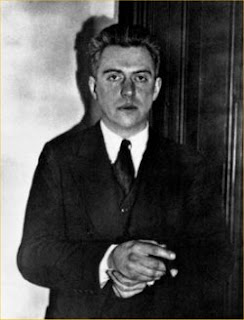July 21 was the birthday of Hart Crane, one of my favorite poets. He was born Harold Hart Crane in Garrettsville, Ohio in 1899. His mother was a Chicago debutante and his father was a very successful candy businessman who actually invented the Lifesaver, the popular ring-shaped mint.
By the time Crane was a teenager, he knew that he was gay, and he was fascinated by the life and career of Oscar Wilde. When his parents' marriage fell apart, Crane dropped out of school and took a train from Cleveland to New York to begin life as a poet. He loved being in New York, hanging out with poets like E.E. Cummings and Allen Tate. But he had trouble making a living there, couldn't hold down a job. His drinking got worse and in 1932, at the age of 33, he killed himself by jumping overboard a steamship on his way from Mexico to New York. He left behind his masterpiece, The Bridge (1930). Finding both inspiration and provocation in the poetry of T. S. Eliot, Crane wrote modernist poetry that was difficult, highly stylized, and ambitious in its scope. In his most ambitious work, The Bridge, Crane sought to write an epic poem, in the vein of The Waste Land, that expressed a more optimistic view of modern, urban culture than the one that he found in Eliot's work. In the years following his suicide at the age of 32, Crane has been hailed by playwrights, poets, and literary critics alike (including Robert Lowell, Derek Walcott, Tennessee Williams, and Harold Bloom), as being one of the most influential poets of his generation.
To Brooklyn Bridge
by Hart Crane
How many dawns, chill from his rippling rest
The seagull's wings shall dip and pivot him,
Shedding white rings of tumult, building high
Over the chained bay waters Liberty--
Then, with inviolate curve, forsake our eyes
As apparitional as sails that cross
Some page of figures to be filed away;
--Till elevators drop us from our day . . .
I think of cinemas, panoramic sleights
With multitudes bent toward some flashing scene
Never disclosed, but hastened to again,
Foretold to other eyes on the same screen;
And Thee, across the harbor, silver-paced
As though the sun took step of thee, yet left
Some motion ever unspent in thy stride,--
Implicitly thy freedom staying thee!
Out of some subway scuttle, cell or loft
A bedlamite speeds to thy parapets,
Tilting there momently, shrill shirt ballooning,
A jest falls from the speechless caravan.
Down Wall, from girder into street noon leaks,
A rip-tooth of the sky's acetylene;
All afternoon the cloud-flown derricks turn . . .
Thy cables breathe the North Atlantic still.
And obscure as that heaven of the Jews,
Thy guerdon . . . Accolade thou dost bestow
Of anonymity time cannot raise:
Vibrant reprieve and pardon thou dost show.
O harp and altar, of the fury fused,
(How could mere toil align thy choiring strings!)
Terrific threshold of the prophet's pledge,
Prayer of pariah, and the lover's cry,--
Again the traffic lights that skim thy swift
Unfractioned idiom, immaculate sigh of stars,
Beading thy path--condense eternity:
And we have seen night lifted in thine arms.
Under thy shadow by the piers I waited;
Only in darkness is thy shadow clear.
The City's fiery parcels all undone,
Already snow submerges an iron year . . .
O Sleepless as the river under thee,
Vaulting the sea, the prairies' dreaming sod,
Unto us lowliest sometime sweep, descend
And of the curveship lend a myth to God.


No comments:
Post a Comment